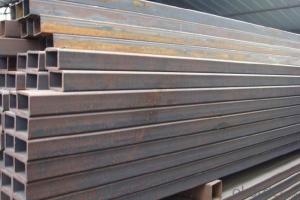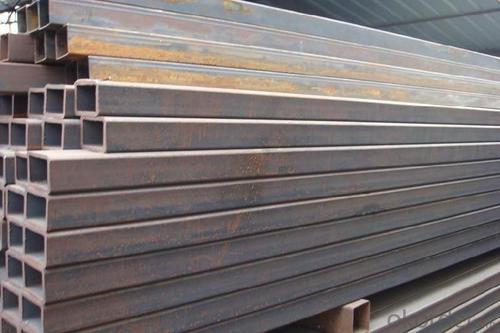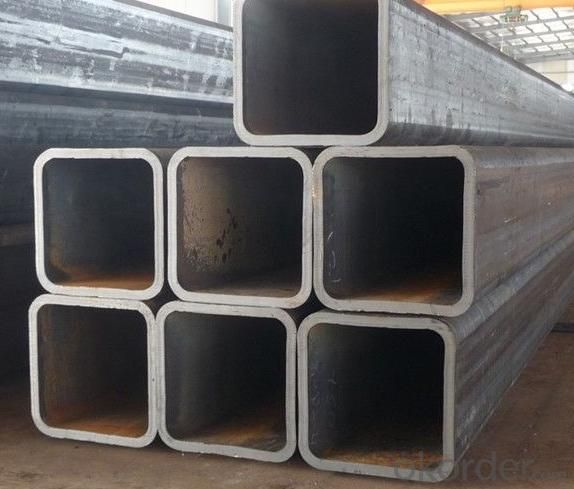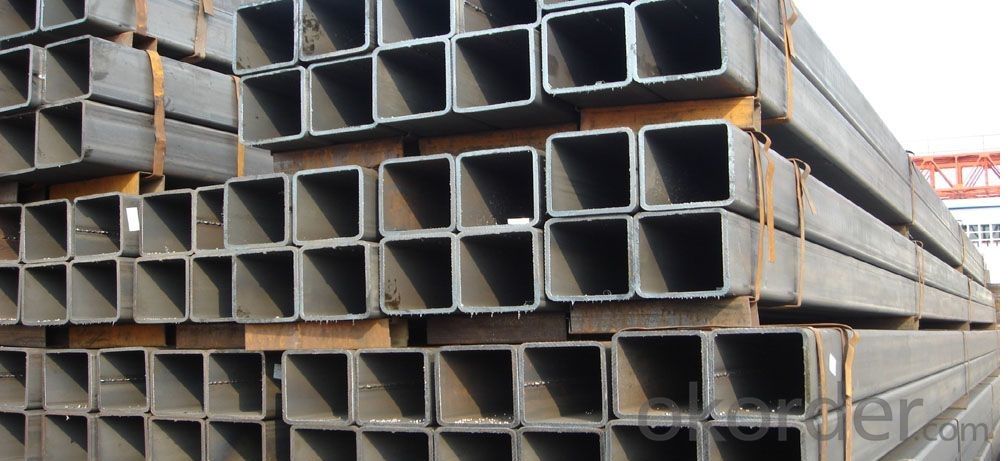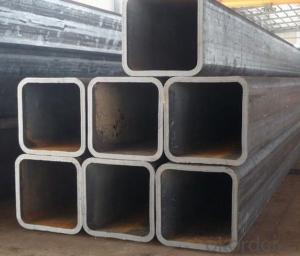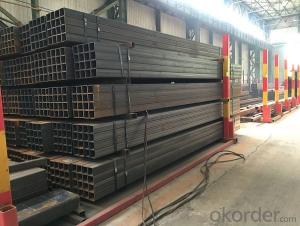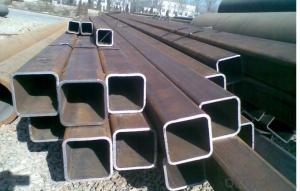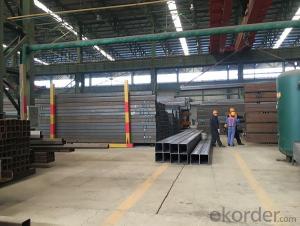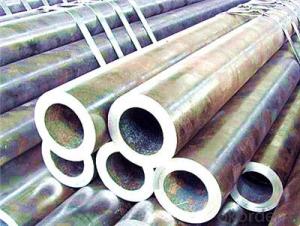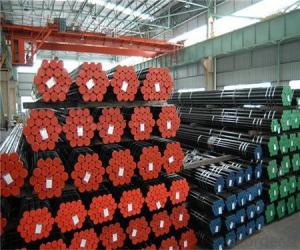Steel Pipe --Various Standard Rectangular Steel Tube
- Loading Port:
- Tianjin
- Payment Terms:
- TT OR LC
- Min Order Qty:
- 25 m.t.
- Supply Capability:
- 6000 m.t./month
OKorder Service Pledge
OKorder Financial Service
You Might Also Like
1、Structure of Rectangular Steel Pipe ASTM A53:
Welded Steel Pipe is to be used for conveying gas, water, and petroleum foroil and natural gas industries. And used for structural steel pies purpose. As the manufacturing process does not include any welding, seamless pipes are perceived to be stronger and more reliable. Historically seamless pipe was regarded as withstanding pressure better than other types, and was often more easily available than welded pipe.
2、Main Features of Rectangular Steel Pipe ASTM A53:
• High manufacturing accuracy
• High strength
• Small inertia resistance
• Strong heat dissipation ability
• Good visual effect
• Reasonable price
3、Rectangular Steel Pipe ASTM A53 Specification:
Standard | GB, DIN, ASTM ASTM A106-2006, ASTM A53-2007 |
Grade | 10#-45#, 16Mn 10#, 20#, 45#, 16Mn |
Thickness | 8 - 33 mm |
Section Shape | Round |
Outer Diameter | 133 - 219 mm |
Place of Origin | Shandong, China (Mainland) |
Secondary Or Not | Non-secondary |
Application | Hydraulic Pipe |
Technique | Cold Drawn |
Certification | API |
Surface Treatment | factory state or painted black |
Special Pipe | API Pipe |
Alloy Or Not | Non-alloy |
Length | 5-12M |
Outer Diameter | 21.3-610mm |
Grade | 20#, 45#, Q345, API J55, API K55, API L80, API N80, API P110, A53B |
Standard | ASME, ASTM |
1) Material:20#(ASTM A 106/A53 GRB.API5LGRB,GB),45#,16Mn,10#.
2) Specification range:OD:21.3-610mm,WT:6-70mm,length:6-12m or according to the requirement of clients.
3) Excutive standards:GB,ASME API5L.ASTM A 106/A53,Despite of the above standards,we can also supply seamless steel pipe with standard of DIN,JIS,and so on,and also develop new products according to the requirements of our clients!
4) Surface:black lacquered,varnish coating or galvanized.
5) Ends:Beveled or square cut,plastic capped,painted.
6) Packing:bundles wrapped with strong steel strip,seaworthy packing.
4、Packaging & Delivery
Packaging Details: | seaworthy package,bundles wrapped with strong steel strip |
Delivery Detail: | 15-30days after received 30%TT |
5、FAQ of Rectangular Steel Pipe ASTM A53:
①How is the quality of your products?
Our products are manufactured strictly according to national and internaional standard, and we take a test
on every pipe before delivered out. If you want see our quality certifications and all kinds of testing report, please just ask us for it.
Guaranteed: If products’ quality don’t accord to discription as we give or the promise before you place order, we promise 100% refund.
②How about price?
Yes, we are factory and be able to give you lowest price below market one, and we have a policy that “ for saving time and absolutely honest business attitude, we quote as lowest as possible for any customer, and discount can be given according to quantity”,if you like bargain and factory price is not low enough as you think, just don’t waste your time.Please trust the quotation we would give you, it is professional one.
③Why should you chose us?
Chose happens because of quality, then price, We can give you both.Additionally, we can also offer professional products inquiry, products knowledge train(for agents), smooth goods delivery, exellent customer solution proposals.Our service formula: good quality+good price+good service=customer’s trust
SGS test is available, customer inspection before shipping is welcome, third party inspection is no problem.
6、 Rectangular Steel Pipe ASTM A53 Images:
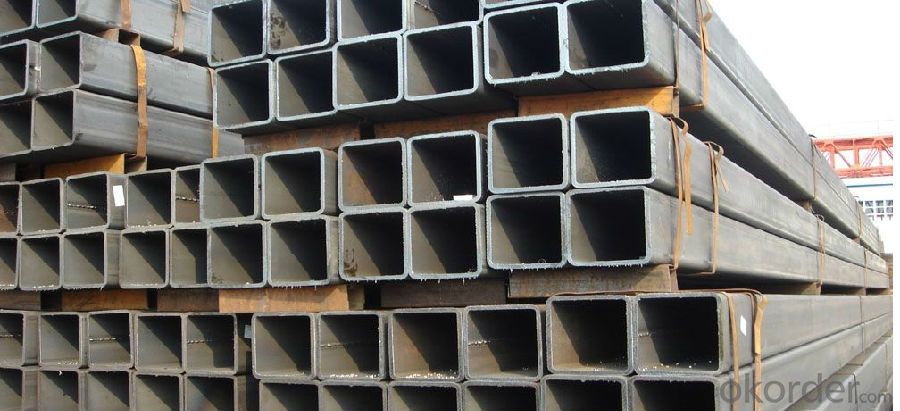
- Q: Can steel pipes be used for the construction of high-rise buildings?
- Yes, steel pipes can be used for the construction of high-rise buildings. Steel pipes offer several advantages such as high strength, durability, and resistance to fire, making them a suitable choice for supporting the structural load and ensuring the stability of tall structures. Additionally, steel pipes can be easily fabricated and installed, providing flexibility in design and construction.
- Q: What time what time for gas pipeline steel pipe PE pipe
- PE pipe is suitable for medium voltage and low voltage 0.4MPa below the pressure pipe wall thickness. According to the different pressure is not the same, so the steel tube can be used for high pressure.
- Q: How are steel pipes protected against chemical corrosion?
- Steel pipes are protected against chemical corrosion through various methods such as applying protective coatings like epoxy or polyethylene, using sacrificial anodes, cathodic protection systems, or employing corrosion inhibitors in the pipeline system.
- Q: What is the purpose of steel pipes?
- The purpose of steel pipes is to provide a reliable and efficient means of transporting fluids and gases, such as water, oil, and natural gas, over long distances. They are also used in various industries for structural support, as well as in plumbing and construction projects.
- Q: Seamless steel tube 89X4 meters, how heavy?
- The theoretical weight calculation formula of plain carbon steel and alloy steel seamless pipe:W=0.02466 (D-S) S, the density of steel fand 7.85kg/dmNote: weight per meter kg/m= (outer diameter wall thickness) * wall thickness *0.02466 units, mm: mmFor example, the seamless steel pipe with a diameter of 89*4 weight per meter:(89-4) *4*0.02466=8.384 kg / M.
- Q: Are steel pipes suitable for pharmaceutical manufacturing facilities?
- Yes, steel pipes are suitable for pharmaceutical manufacturing facilities. Steel pipes are commonly used in pharmaceutical manufacturing due to their excellent corrosion resistance and durability. They can withstand high pressure and temperature conditions, making them ideal for various applications such as transporting fluids, gases, and chemicals within the facility. Additionally, steel pipes can be easily cleaned and sanitized, ensuring the integrity and safety of pharmaceutical products. Furthermore, steel pipes are cost-effective and have a long service life, making them a reliable choice for pharmaceutical manufacturing facilities.
- Q: What are the different wall thicknesses available for steel pipes?
- The different wall thicknesses available for steel pipes vary depending on the specific application and requirements. Common wall thicknesses for steel pipes include standard, extra strong, and double extra strong, with each thickness offering different levels of strength and durability.
- Q: What is PE coated steel pipe? Seek explanation
- The appearance of the native HDPE is milky white and is somewhat translucent in the narrow cross section. PE has excellent properties that are resistant to most life and industrial chemicals. Polyethylene (PE) pipe due to its unique advantages and is widely used in building water supply, drainage, underground drainage pipe, building heating, gas pipelines, electrical and telecommunications, industrial protective casing pipes, agricultural pipes etc.. The utility model is mainly used for urban water supply, urban gas supply and farmland irrigation.
- Q: How are steel pipes protected against rust and corrosion?
- Steel pipes are protected against rust and corrosion through various methods such as applying protective coatings like zinc or epoxy, using cathodic protection techniques, or by utilizing stainless steel pipes that have inherent resistance to rust and corrosion. Additionally, regular maintenance and inspections help to identify and address any potential corrosion issues early on.
- Q: How are steel pipes used in automotive manufacturing?
- Automotive manufacturing extensively employs steel pipes for a multitude of purposes. The exhaust system represents one of the principal functions of steel pipes in this industry. In vehicles, the exhaust system is accountable for securely eliminating harmful gases generated during the combustion process. Steel pipes are employed in fabricating the exhaust manifold, which collects exhaust gases from the engine cylinders and directs them towards the exhaust pipe. Additionally, steel pipes are also utilized in constructing the chassis and frame of vehicles. The chassis offers structural support and aids in upholding the overall strength and stability of the vehicle. Due to their exceptional strength and durability, steel pipes are the optimal choice for manufacturing the chassis and frame. These pipes are frequently welded together to form a rigid and robust structure capable of withstanding diverse forces and impacts. Furthermore, steel pipes find application in the suspension system of automobiles. The suspension system is responsible for delivering a comfortable and smooth ride by absorbing shocks and vibrations. Steel pipes are employed in manufacturing suspension components such as control arms, tie rods, and sway bars. These components contribute to maintaining the stability, handling, and overall performance of the vehicle. Moreover, steel pipes are utilized in the fuel system of automobiles. They are responsible for transporting fuel from the fuel tank to the engine. These pipes necessitate resistance to corrosion and possess high tensile strength to guarantee the safe and efficient delivery of fuel. In conclusion, steel pipes play a pivotal role in automotive manufacturing. They are utilized in diverse applications including the exhaust system, chassis and frame construction, suspension system, and fuel system. The incorporation of steel pipes in these areas ensures the durability, strength, and performance of vehicles while simultaneously upholding safety and efficiency.
Send your message to us
Steel Pipe --Various Standard Rectangular Steel Tube
- Loading Port:
- Tianjin
- Payment Terms:
- TT OR LC
- Min Order Qty:
- 25 m.t.
- Supply Capability:
- 6000 m.t./month
OKorder Service Pledge
OKorder Financial Service
Similar products
Hot products
Hot Searches
Related keywords
